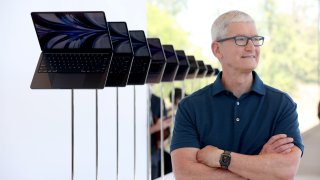
- Apple could release a MacBook Pro laptop with a touchscreen as soon as 2025, according to a report from Bloomberg.
- The move would mark a significant reversal for Apple, which has said for years that touchscreen laptops are ergonomically inferior.
- Apple's Mac business doesn't need a shot in the arm — sales are up 40% since 2020.
Apple could release a MacBook Pro laptop with a touchscreen as soon as 2025, according to a report from Bloomberg.
Teams inside Apple are working on the project, and the first design would include a trackpad and keyboard as well as a touchscreen, according to the report.
The move, if it were to happen, would mark a significant reversal for Apple, which has said for years that touchscreen laptops are ergonomically inferior, even as competing Windows laptops now have touchscreens as a standard feature.
Get DFW local news, weather forecasts and entertainment stories to your inbox. Sign up for NBC DFW newsletters.
"We really feel that the ergonomics of using a Mac are that your hands are rested on a surface, and that lifting your arm up to poke a screen is a pretty fatiguing thing to do," Apple's head of software Craig Federighi said in 2018, adding that he's "not into touchscreens" on PCs.
More recently, he was asked at a conference whether Apple would release a touchscreen laptop, and he said, "who's to say?"
Apple's Mac business doesn't need a shot in the arm, though. Mac sales surged when Apple replaced Intel processors in most of its computers with its own silicon. The change improved battery life and reduced overheating. Apple's Mac business generated $40.1 billion in revenue during the company's fiscal 2022, up 14% from 2021.
A touchscreen Mac would require significant software changes to accept finger taps, which require larger buttons, instead of mouse clicks. Apple's iPhone and iPads use an operating system designed for touchscreens, while macOS can currently only be controlled with a mouse and keyboard.
Money Report
An Apple representative didn't respond to a request for comment.






